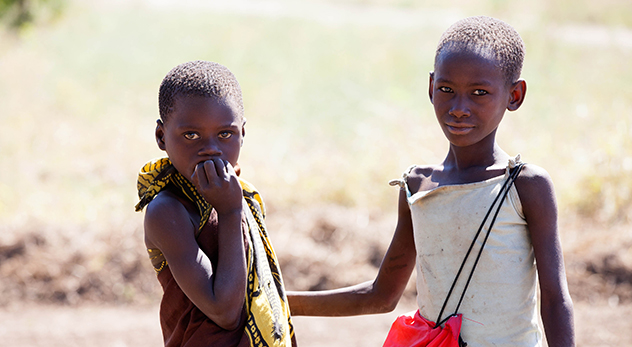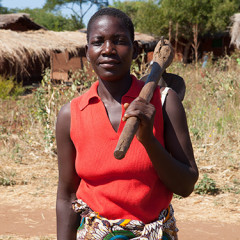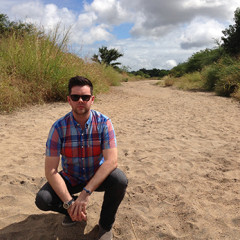
After interviewing dozens of Malawians, Jonathan Merritt of RNS realizes that churches may hold the key to addressing climate concerns – Image courtesy of Clive Mears, Tearfund.
(RNS) — My shoes sank deep into the crystalline sand of what used to be a river. An elderly man from Fombe village, Malawi told me that water streamed here year round when he was a child. Banana trees and other vegetation once flourished on its banks, and an abundance of fish provided a critical source of protein for those who lived nearby. In 1977, however, the waters began receding and now flow only a handful of days each year.
In America, climate change is a matter of debate, but in places like Malawi, it’s a matter of life and death.
This small country is one of the poorest and most densely populated in the world. Ninety percent of Malawians live off the grid, and nearly four out of ten are undernourished. Among children under five years old, 63 percent are anemic and nearly half are stunted according to USAID.

Among children in Malawi under five years old, 63 percent are anemic and nearly half are stunted according to USAID – image courtesy of Clive Mears, Tearfund
At first blush, it is difficult to understand why there is so much suffering in Malawi. The soil is rich in nutrients and pastoral parcels of land await development. But with an agro-based economy where more than three-fourths of the population relies on rain-fed agriculture for survival, the changing climate neutralizes the benefits of Malawi’s natural resources.
After traveling across the landlocked, sub-Saharan country to interview dozens of farmers in sparsely populated villages, a recurring storyline emerged. The climate is changing, and the resulting problems are difficult to overcome. Since at least 2000, Malawi has seen an increase in floods and droughts, a trend first recognized by indigenous leaders and later confirmed by the government.

A single mom farms her field. Like most Malawians, she has to work harder to produce less food – image courtesy of Clive Mears, Tearfund
Again and again, elderly men and women recount how the rainy season once came in October and held strong until March. Now the first rains arrive as late as December and may conclude as early as February. The farmland that used to feed a family for an entire year now only yields enough food for eight months or less. In short, farmers have to work harder to produce less.
“When we had adequate and steady rainfall, things were good,” a farmer named James told me. “These days no one knows when to plant crops, and if we plant, you don’t know if you’ll receive a harvest.”
He and his wife didn’t harvest even one bag of food in 2002.
Not only has the season shifted, but the amount of rainfall has also changed. It has become more erratic, fluctuating wildly between droughts and spontaneous floods. In one case, floods rerouted rivers that flowed normally since at least the 1960s, according to the village headman in Fombe. Now heavy rains regularly divert rivers, washing away crops and livestock and even claiming human lives.
According to NASA atmospheric scientist William Lau climate change directly affects local precipitation: “In response to carbon dioxide-induced warming, the global water cycle undergoes a gigantic competition for moisture resulting in a global pattern of increased heavy rain, decreased moderate rain, and prolonged droughts in certain regions.”
When Americans return from mission trips or after traveling abroad, they often say, “The people were poor, but they are so happy.” Not so here. These people are poor and miserable. Their stories and tired eyes serve as not-so-subtle reminders that climate change affects more than polar bears. It also impacts people.
People like Edward, 42, who has been forced to grow and feed his family millet, a crop Americans use for birdseed. And Alita, 58, who says she longs for the days of her childhood when they had enough water to drink. And James, 61, who is unable to produce the crops he once did because of the unreliable rains. And also Charlie, 56, who once fed his 10 children all year from the harvest, but no longer.
“Climate change is more challenging to our country than HIV-AIDS because it affects everyone,” says Vincent Moyo, the country representative for Tearfund, an evangelical relief organization based in the U.K. “Climate change is carrying with it a slow death.”
When it comes to climate, many Americans rely on talking points provided to them by talk show hosts or political commentators. But Malawians don’t have that luxury. They must learn to adapt, and quickly.
When Grace Kasowa, a Presbyterian farmer in Chagunda village was asked what message she has for American evangelicals, she told one of my fellow travelers, “You tell those Doubting Thomases that climate change is real and has a negative impact on people. Less rain means I can’t grow vegetables any more. Hungry elephants and other wild animals are coming into our village to rummage for our food and water.”

Standing in a dried-up river that once teemed with fish and flourished with vegetation – image by Jonathan Merritt
Approximately 80 percent of Malawians claim to be Christian, and now 60 percent are food insecure on a year-round basis. Jesus-followers cannot afford to ignore the problems experienced by our brothers and sisters lest one day we stand in postmortem judgment wondering, “Lord, when did we see you hungry and not feed you, or see you thirsty and not give you something to drink?”
That’s why Loving the Least of These: Addressing a Changing Environment, a booklet put out by the National Association of Evangelicals declares, “Jesus tells his disciples that on Judgment Day, we will stand before God and answer for the way we treated those who were hungry, naked and sick, and for those who were strangers and prisoners…. There are millions of suffering people in the world, and thousands of Christians who offer them assistance. Unfortunately, the realities of climate change mean that those suffering millions may become billions. All of us who follow Jesus will need to respond.”
Luckily, the church can breathe hope in places like Malawi that exist on the sharp edge of climate disruption. In distant villages where there isn’t a government organization or even a proper school, there is often still a church. And unlike other relief and development organizations, churches are permanent outposts that don’t disappear when grant money dries up. No other organization has the coverage, permanence, and mission that churches do.
For these reasons and others, organizations like Tearfund work exclusively with organizations that mobilize local churches to perform critical relief work. Cooperating churches in the region work on irrigation projects and crop and animal diversification. They are developing community-based early warning systems by monitoring water flow in rising rivers and rainfall patterns. They are constructing dykes and planting trees to prevent flooding and curb erosion. And they are training farmers to do “conservation agriculture” to increase crop yield.
My time in Malawi offered me a two-fold education. I learned that some regions of the world are already experiencing the deleterious effects of climate disruption. And I learned that the Church can be a critical component in helping those who are suffering as a result.
Before leaving Malawi, I spoke to a man named Andre who stood under a tree gripping a tattered New Testament wrapped in brown masking tape. He told me that he reads it and then prays to ask God for assistance with the problems he and his family are facing. I can’t help thinking that the “Body of Christ” spoken about in the book Andre holds might just be the answer to his prayers.
If only we have eyes to see the plight and ears to hear the cries of our brothers and sisters who need our help.
*For more images from Jonathan’s trip, visit his Facebook page.*






